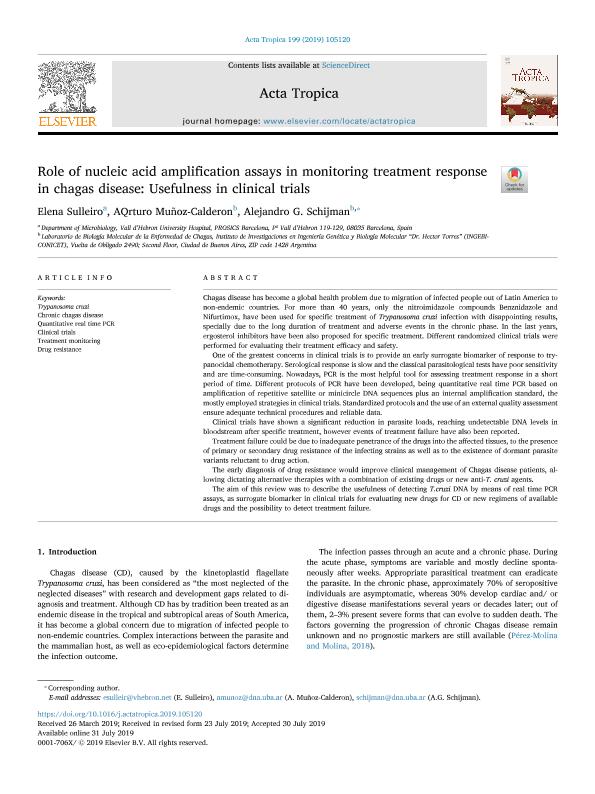Mostrar el registro sencillo del ítem
dc.contributor.author
Sulleiro Igual, Elena

dc.contributor.author
Muñoz Calderon, Arturo Alejandro

dc.contributor.author
Schijman, Alejandro Gabriel

dc.date.available
2020-05-12T16:58:12Z
dc.date.issued
2019-11
dc.identifier.citation
Sulleiro Igual, Elena; Muñoz Calderon, Arturo Alejandro; Schijman, Alejandro Gabriel; Role of nucleic acid amplification assays in monitoring treatment response in chagas disease: Usefulness in clinical trials; Elsevier Science; Acta Tropica; 199; 105120; 11-2019; 1-6
dc.identifier.issn
0001-706X
dc.identifier.uri
http://hdl.handle.net/11336/104887
dc.description.abstract
Chagas disease has become a global health problem due to migration of infected people out of Latin America to non-endemic countries. For more than 40 years, only the nitroimidazole compounds Benznidazole and Nifurtimox, have been used for specific treatment of Trypanosoma cruzi infection with disappointing results, specially due to the long duration of treatment and adverse events in the chronic phase. In the last years, ergosterol inhibitors have been also proposed for specific treatment. Different randomized clinical trials were performed for evaluating their treatment efficacy and safety. One of the greatest concerns in clinical trials is to provide an early surrogate biomarker of response to trypanocidal chemotherapy. Serological response is slow and the classical parasitological tests have poor sensitivity and are time-consuming. Nowadays, PCR is the most helpful tool for assessing treatment response in a short period of time. Different protocols of PCR have been developed, being quantitative real time PCR based on amplification of repetitive satellite or minicircle DNA sequences plus an internal amplification standard, the mostly employed strategies in clinical trials. Standardized protocols and the use of an external quality assessment ensure adequate technical procedures and reliable data. Clinical trials have shown a significant reduction in parasite loads, reaching undetectable DNA levels in bloodstream after specific treatment, however events of treatment failure have also been reported. Treatment failure could be due to inadequate penetrance of the drugs into the affected tissues, to the presence of primary or secondary drug resistance of the infecting strains as well as to the existence of dormant parasite variants reluctant to drug action. The early diagnosis of drug resistance would improve clinical management of Chagas disease patients, allowing dictating alternative therapies with a combination of existing drugs or new anti-T. cruzi agents. The aim of this review was to describe the usefulness of detecting T.cruzi DNA by means of real time PCR assays, as surrogate biomarker in clinical trials for evaluating new drugs for CD or new regimens of available drugs and the possibility to detect treatment failure.
dc.format
application/pdf
dc.language.iso
eng
dc.publisher
Elsevier Science

dc.rights
info:eu-repo/semantics/openAccess
dc.rights.uri
https://creativecommons.org/licenses/by-nc-sa/2.5/ar/
dc.subject
CHRONIC CHAGAS DISEASE
dc.subject
CLINICAL TRIALS
dc.subject
DRUG RESISTANCE
dc.subject
QUANTITATIVE REAL TIME PCR
dc.subject
TREATMENT MONITORING
dc.subject
TRYPANOSOMA CRUZI
dc.subject.classification
Bioquímica y Biología Molecular

dc.subject.classification
Ciencias Biológicas

dc.subject.classification
CIENCIAS NATURALES Y EXACTAS

dc.title
Role of nucleic acid amplification assays in monitoring treatment response in chagas disease: Usefulness in clinical trials
dc.type
info:eu-repo/semantics/article
dc.type
info:ar-repo/semantics/artículo
dc.type
info:eu-repo/semantics/publishedVersion
dc.date.updated
2020-04-23T19:20:05Z
dc.identifier.eissn
1873-6254
dc.journal.volume
199
dc.journal.number
105120
dc.journal.pagination
1-6
dc.journal.pais
Países Bajos

dc.journal.ciudad
Amsterdam
dc.description.fil
Fil: Sulleiro Igual, Elena. Universidad Autónoma de Barcelona. Hospital Vall D' Hebron; España
dc.description.fil
Fil: Muñoz Calderon, Arturo Alejandro. Consejo Nacional de Investigaciones Científicas y Técnicas. Instituto de Investigaciones en Ingeniería Genética y Biología Molecular "Dr. Héctor N. Torres"; Argentina
dc.description.fil
Fil: Schijman, Alejandro Gabriel. Consejo Nacional de Investigaciones Científicas y Técnicas. Instituto de Investigaciones en Ingeniería Genética y Biología Molecular "Dr. Héctor N. Torres"; Argentina
dc.journal.title
Acta Tropica

dc.relation.alternativeid
info:eu-repo/semantics/altIdentifier/doi/http://dx.doi.org/10.1016/j.actatropica.2019.105120
dc.relation.alternativeid
info:eu-repo/semantics/altIdentifier/url/https://www.sciencedirect.com/science/article/pii/S0001706X19303997
Archivos asociados
